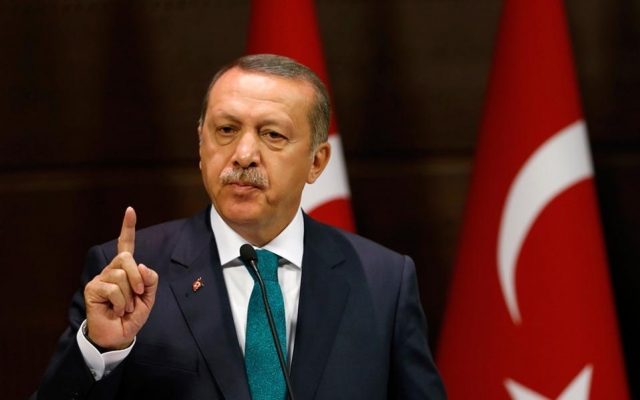Çabuk Still Facing Extradition as Erdogan Threatens to “Chop off the Heads of Traitors”
On July 16, European Parliament Member (MEP) Rebecca Harms visited Georgia to support Mustafa Emre Çabuk, a Turkish teacher who has been in custody since May 24 when the Turkish government accused him of participating in a terrorist organization, and which now demands his extradition. Tbilisi City Court ruled on May 25 that Çabuk would stay in a three-month pre-extradition detention.
Çabuk settled in Georgia 15 years ago and began working at the Demirel Private College in Tbilisi, which is associated with the Gülen Movement, an organization created by the US-based imam Fethullah Gülen. This movement is considered a terrorist group by the Turkish government, which calls it the FETÖ (translated as the “Gülenist Terror Organization”). The Turkish government claim the FETÖ is behind the attempted coup that shook Turkey one year ago.
The MEP stated at a special press-conference that “teaching in a school linked to Gülen is not a crime” and called on the Georgian government to grant political asylum to Çabuk.
Harms’ visit was no coincidence, since it is occurred on the anniversary of the attempted coup. Throughout the past year, Turkish authorities have held what some consider a “witch-hunt” against alleged supporters of the coup, resulting in hundreds of arrests, including of journalists and scholars. The same day of the MEP’s visit, Turkey celebrated the anniversary of the coup failure, on the occasion of which President Recep Tayyip Erdogan threatened to “chop off the heads of traitors,” referring to the people he accuses of having tried to destabilize his power. At the top of his list is the Gülen movement.
Harms spoke critically of the current situation, saying that “it goes beyond [Çabuk’s] personal case,” highlighting basic human rights: “nobody should be prosecuted like that, [especially not] a teacher.”
But the Georgian government sees things otherwise- Georgia is placed between two major international powers: Russia and Turkey. Since 2008 and the breaking of relations with Russia, Georgia has had no other choice but to cooperate with and conform to the whims of its ever more controversial neighbor. And what stands out in this latest case is that Çabuk seems to be beyond reproach. Georgian authorities investigated the school where he taught but found nothing they could relate to a terrorist organization. “The Government of Georgia, the countries of the European Union, should categorically refuse to extradite Mustafa Emre Çabuk to Turkey. He and his family members must be granted political asylum in Georgia or elsewhere,” Harms said.
The European Parliamentarian visited Çabuk in prison on Sunday and thanked the prison administration for treating him well. The teacher and his family assure the Georgian authorities that there is high risk that he will face torture if extradited to a Turkish prison, and the recent statements made by Erdogan do nothing to dissuade on this point. For this reason, the family applied for asylum in Georgia, though their request was rejected by authorities earlier this month. Rebecca Harms expressed regret at this decision and promised “to try to convince the EU to offer asylum to Çabuk and his family”. She noted that the EU could do a lot more considering the gravity of the case, which “involves clear violations of human rights”. Meanwhile, she says she will try to remind both the Georgian government and the EU to be on the side of the rule of law, observing that “we cannot expect justice from Turkey”.
Çabuk’s case is also linked with the presumed kidnapping of Azerbaijani journalist and political activist, Afghan Mukhtarli, on May 29, who reappeared after less than 24 hours with the Azerbaijani border police. He is now in custody in Azerbaijan, facing accusations of illegal border-crossing and smuggling and is unable to receive visits from family or friends.
Harms also spoke about this case on her visit, having met Mukhtarli’s family herself. “I strongly support their request to the Georgian government to organize an independent investigation into his disappearance,” she said. “I think Mukhtarli and his wife should be granted the status of victims. We should not stop fighting for [his] release... His situation in the Azerbaijani prison is much harder than the situation of Mustafa Emre Çabuk in Georgia. In this respect, I will appeal to the Azerbaijani government," she added.
David Mongazon












